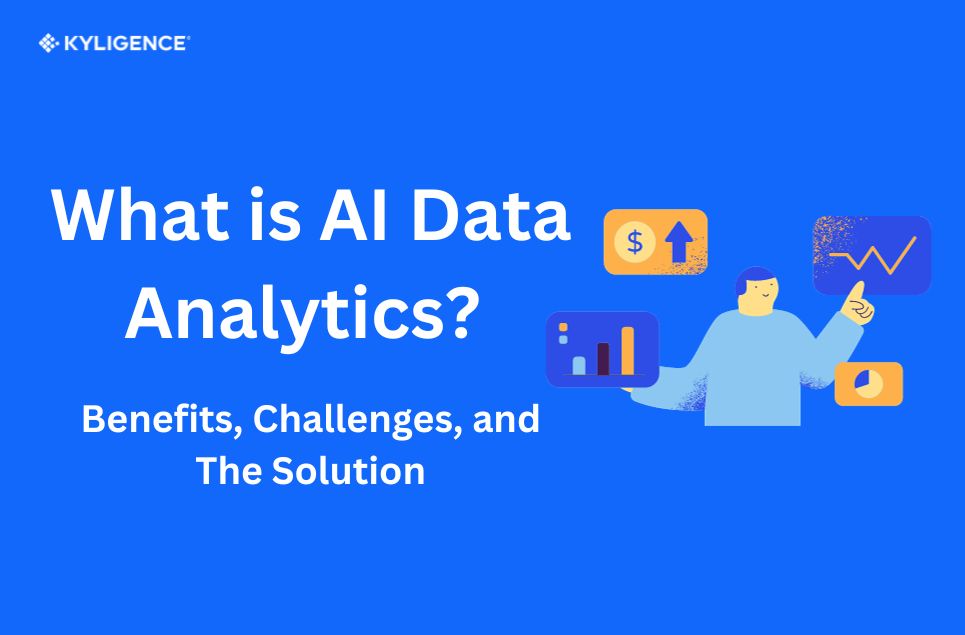Ⓒ 2023 Kyligence, Inc. All rights reserved.

Introduction
Artificial Intelligence (AI) has revolutionized various industries, and one of its most significant applications is in the field of data analytics.
In today's data-driven world, organizations are constantly collecting massive amounts of data from various sources. However, the challenge lies in extracting meaningful insights from this vast sea of information. This is where AI data analytics comes into play.
What is AI data analytics?
AI data analytics refers to the use of artificial intelligence techniques to analyze and interpret complex datasets. It involves the application of algorithms and machine learning models to uncover patterns, trends, and correlations within the data.
By leveraging AI capabilities, organizations can gain valuable insights that can drive informed decision-making and improve business outcomes.
Benefits of AI Data Analytics
AI data analytics offers numerous benefits to organizations across various industries.
Let's explore some of the key benefits of AI data analytics:
1. Improved decision-making
Utilizing AI data analytics can provide valuable insights for making informed decisions.
Traditional methods of data analysis often rely on manual processes and limited human capabilities, which can lead to errors and biases.
However, with AI-powered analytics, organizations can leverage machine learning algorithms to analyze vast amounts of data quickly and accurately.
2. Enhanced efficiency and productivity
AI data analytics automates repetitive tasks and streamlines processes- leading to increased efficiency and productivity.
Manual data analysis can be time-consuming and prone to errors, especially when dealing with large datasets.
With AI-powered tools, organizations can automate various aspects of the analysis process, such as data cleaning, feature selection, model training, and result interpretation.
By reducing the time spent on manual tasks, employees can focus on higher-value activities such as interpreting results, generating insights, and implementing strategies based on those findings.
This not only improves overall productivity but also allows organizations to allocate resources more effectively.
3. Better customer experience
AI data analytics enables businesses to personalize customer experiences and deliver targeted recommendations.
By analyzing customer behavior patterns, preferences, purchase history, and other relevant data points, organizations can gain a deeper understanding of their customers' needs and preferences.
With this insight at hand, businesses can create personalized marketing campaigns that resonate with individual customers.
By delivering tailored product recommendations or personalized offers in real-time, organizations can enhance customer satisfaction and engagement.
This, in turn, can lead to increased customer loyalty and repeat business.
4. Competitive advantage
Implementing AI data analytics can give organizations a competitive edge by uncovering hidden patterns and trends.
By leveraging AI-powered analytics tools, organizations can identify emerging market trends, predict customer behavior, and anticipate industry disruptions. This allows businesses to stay ahead of the curve and make proactive decisions that drive growth and innovation.
Challenges in Implementing AI Data Analytics
Implementing AI data analytics can present several challenges for organizations.
Here are some of them:
1. Data quality and accessibility
One of the major challenges in implementing AI data analytics is ensuring the availability of high-quality data and overcoming data silos.
High-quality data is essential for accurate analysis and decision-making. However, organizations often face difficulties in accessing relevant and reliable data from various sources within their organization.
Additionally, data may be stored in different formats or scattered across different systems, making it challenging to integrate and analyze effectively.
2. Lack of skilled professionals
Another challenge faced by organizations is the shortage of skilled professionals in the field of AI data analytics. The successful implementation of AI requires individuals with expertise in machine learning algorithms, statistical analysis, programming languages like Python or R, and domain knowledge specific to the industry or business problem at hand.
Finding and hiring qualified professionals with these skills can be a daunting task for organizations. The demand for such talent often exceeds the supply- leading to fierce competition among companies to attract top-notch candidates. Moreover, training existing employees to acquire these skills takes time and resources.
3. Ethical considerations
AI data analytics raises ethical concerns regarding privacy, bias, and the responsible use of data. As organizations collect and analyze vast amounts of data, there is a need to ensure that privacy rights are respected and sensitive information is protected.
The potential for bias in AI algorithms also poses a challenge, as biased models can lead to unfair outcomes or reinforce existing inequalities.
4. Scalability and infrastructure
Scaling AI data analytics systems and ensuring robust infrastructure can pose challenges for organizations. As the volume of data grows, organizations need scalable solutions that can handle large datasets efficiently.
Additionally, AI algorithms require significant computational power and storage capabilities to process complex analyses in real-time.
To overcome scalability challenges, organizations can leverage cloud-based solutions that provide flexible computing resources on-demand. Cloud platforms offer scalability- allowing organizations to scale up or down based on their needs without investing in expensive hardware infrastructure.
Introducing Kyligence Zen as a Solution
Kyligence Zen stands out as a powerful solution for AI data analytics- offering a comprehensive set of features that enable businesses to harness the full potential of their data.
With Kyligence Zen, organizations can seamlessly integrate AI into their analytics workflows, empowering data analysts and scientists to derive valuable insights with ease.
Ability to handle massive data
One of the key capabilities of Kyligence Zen is its ability to handle massive volumes of data. Kyligence Zen leverages cutting-edge technologies to ensure lightning-fast query response times, even when dealing with petabytes of data.
This allows organizations to make real-time decisions based on up-to-date information- giving them a competitive edge in today's fast-paced business landscape.
Advanced machine learning
Another notable feature of Kyligence Zen is its advanced machine learning capabilities. By incorporating AI algorithms into the analytics process, Kyligence Zen enables businesses to uncover hidden patterns and correlations within their data.
This not only enhances the accuracy and depth of analysis but also facilitates predictive modeling and forecasting. With Kyligence Zen's machine learning capabilities, organizations can gain valuable insights into customer behavior, market trends, and other critical factors that drive business success.
Conclusion
AI data analytics has emerged as a game-changer for businesses seeking to leverage their vast amounts of data effectively.
While implementing AI data analytics poses challenges such as handling massive datasets and integrating machine learning algorithms seamlessly, solutions like Kyligence Zen provide an answer to these obstacles.
With its powerful capabilities and features, Kyligence Zen empowers organizations to unlock the full potential of their data and make data-driven decisions with confidence.
Try Kyligence Today for free or book a demo call!
See Also
Decoding the Fundamentals: What Does a Metric Mean in Google Analytics?
Differentiating Data Consumer and Data Producer: Key Features & Advantages
Unveiling the Advantages of Tableau in a Data Lake Setting for Advanced Data Analytics
Optimizing Productivity through Power BI Self-Service Data Visualization, Reporting, and Analytics
Harnessing the Potential of AI Analytics Tools for Data Analysis
